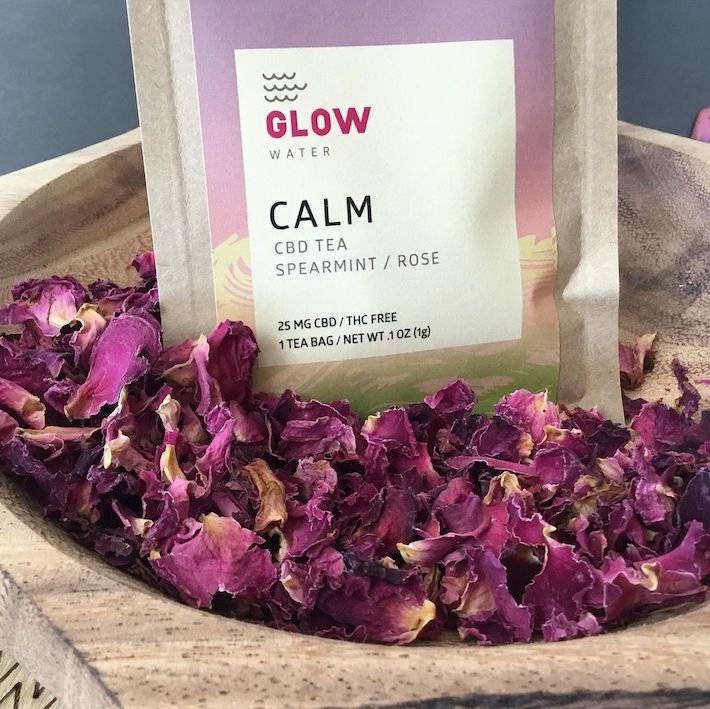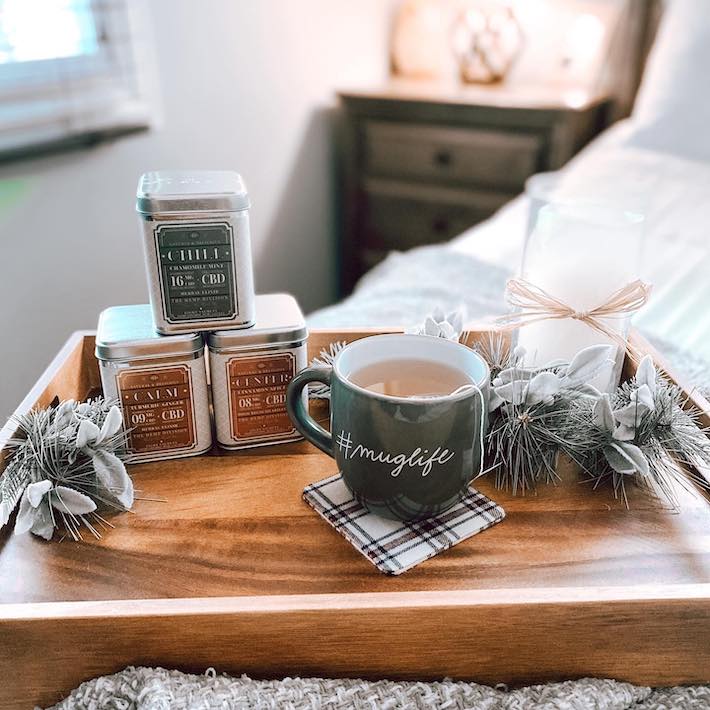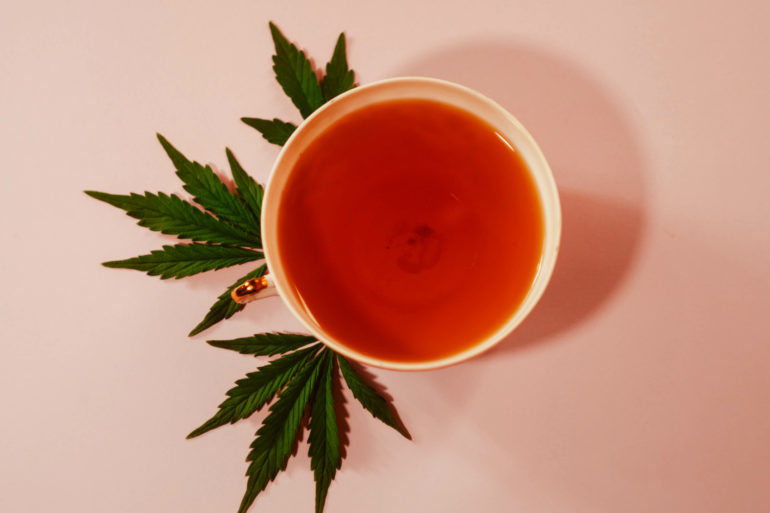Just as it sounds, CBD tea is a type of tea that’s been infused with cannabidiol. You enjoy the tea as you would any other tea; however, after a short period of time, you’ll start to notice the effects of the CBD working throughout the body.
From reduced muscle tension to full-body relaxation and even help on the stomach, CBD tea offers unique benefits that other CBD products — and typical tea — simply don’t.
Understanding CBD Tea and How It’s Made
CBD tea is a highly sought-after hemp product that’s grown in popularity extensively over the past few years.
Emeric Harney, the marketing manager over at Harney & Sons popular tea brand, knows a thing or two about CBD teas, having created an entire Hemp Division for their products. He explains that there has been a “proliferation of CBD-infused beverage options, ranging from ready-to-drink (RTD) beverages like teas, coffees, and juices to water-soluble CBD powders or additives that can be mixed with liquids.”
There are herbal teas, green, white, black, citrus teas, and more, all of which have been infused with varying amounts of cannabidiol.
Of course, different tea blends will bring different flavor profiles, too, just like your regular cup of tea. So, whether you’re looking for peppermint, berry, or something completely unique, there’s a CBD tea out there for you.
The way that CBD tea is made greatly depends on the manufacturer, as well as the type of tea they’re creating. Loose-leaf tea may contain small amounts of hemp flower itself, while other teas may be infused with CBD extract, instead.
Finally, the amount of CBD within the infused tea is also going to vary. You will find subtle, mild, strong, and even extra-strong CBD tea options, so you can find the right potencies for your needs.
Should You Drink CBD Tea? Exploring the Benefits
There are many reasons why people choose to drink CBD tea.
Primarily, people have found CBD tea to be a great option for aiding in relaxation in the morning. For some, the caffeine levels in a cup of coffee can bring about serious jitters or even unnecessary anxiety.
CBD tea, on the other hand, is said to be incredibly soothing. Emeric Harney explains that “many individuals find that sipping on CBD-infused tea promotes relaxation and a sense of calm, which can be particularly beneficial for those dealing with stress or anxiety.”
Harney also adds that “drinking tea can have a soothing effect on the digestive system, and CBD tea may provide additional relief for those experiencing gastrointestinal issues.”
Essentially he’s saying that, as a whole, it can be soothing on the stomach, and the CBD cannabinoid offers anti-nausea properties that can do wonders for those with an upset digestive system.
Eloise Theisen, a board-certified adult geriatric nurse practitioner, says, “CBD tea is a great way to consume cannabidiol throughout the day in a unique and refreshing way. CBD is more water soluble than THC and therefore may be more bioavailable (also known as the dose).”
Theisen goes on to say, “many people are looking for ways to consume CBD without added sugar and CBD tea is one way to do just that. Adding a little fat to the tea with milk, MCT oil, or butter can also increase the bioavailability of CBD and enhance the overall experience. Many of my patients enjoy the benefits of CBD in their tea as they sip on it slowly throughout the day giving them more of a longer lasting effect.”
How CBD Tea Works in the Body
The way that CBD tea works in the body is a bit different than how other cannabinoid products function. And it all starts with digestion.
Of course, you’re going to drink your CBD tea as you would any other tea. From there, your body must digest the infused beverage before the compounds can be absorbed into the bloodstream. Once they are in the bloodstream, though, the CBD compounds can start to work with the cannabinoid receptors throughout the body, assisting with the regulation of the endocannabinoid system (ECS) as a whole.
Compared to THC, CBD doesn’t actually bind to the cannabinoid receptors in the ECS. Instead, the cannabinoid works with the ECS to help regulate the breakdown and production of the body’s natural endocannabinoids, which can help lead to myriad benefits and relief. (And we’ll talk more about those benefits next.)
Typically, people can expect to wait about 30 minutes to an hour for the results of their CBD-infused teas to start working.
Okay, So…What’s the Difference Between CBD Tea and Regular Tea?
The main difference between CBD tea and regular tea is, obviously, the fact that the blend has been infused with cannabidiol. While this doesn’t tend to change the tea’s flavor profile all that much, it does influence the spectrum of results you feel from your tea.
With typical non-infused tea, you aren’t going to experience the same additional levels of relaxation or comfort as you would with CBD tea. While some tea blends are known for being calming, CBD offers specific relieving qualities that can do wonders for those who are on edge or just need a bit of a break.
CBD is generally considered to be a safe substance, making it a good option to add to teas or other beverages. However, for ultimate safety, you only want to stick to high-quality, third-party-tested products from reputable brands.
How Much CBD Tea Should You Drink?

How much CBD tea you should drink highly depends on your personal tolerance to CBD, as well as why you’re consuming it in the first place. Typically, one cup of CBD tea will do the trick, though the strength of your tea is going to depend on the strength of the CBD inside.
If you’re concerned about dosing or coming across products that haven’t been as precise as you’d like, Emeric Harney from Harney & Sons is here to reassure you: “With decades of experience in the tea industry, Harney & Sons has honed its expertise in blending various teas and herbs to create unique flavor profiles that complement the CBD infusion.”
He then goes on to say, “The Hemp Division maintains consistent CBD dosage and quality control across our infused tea products, ensuring that customers receive a reliable and enjoyable experience with every cup.”
If you’re wanting a go-to CBD brand to rely on, Emeric Harney is confident that their line is the one.
Are There Risks or Side Effects to Drinking CBD Tea?
As with any CBD product, there are slight side effects that can come with drinking CBD tea, especially if you consume too much. Overconsumption of CBD tea can lead to the following negative side effects:
- Nausea or vomiting
- Fatigue or drowsiness
- Dry mouth
- Reduced appetite
- Low blood pressure
- Dizziness
- Potential drug interactions with other medications
The best way to avoid these side effects is by starting with a mild dosage of CBD tea (somewhere around 5-10mg) and only having a little bit to drink. Then, as your body adjusts to the effects, you can always consume more the next time around.
As Emeric Harney points out, “Regulatory frameworks for CBD products continue to evolve, with some jurisdictions providing clearer guidelines,” and this has helped create a level of confidence for both consumers and manufacturers.
So, while there are always potential risks to enjoying cannabinoids, as the industry evolves, regulations only become more, well, regulated.
Tips for Buying the Best CBD Tea

If you’re interested in buying the best CBD tea possible, you have to do a bit of research first. Right now, there are so many different CBD tea brands on the market, and some are much better — and tastier — than others. So, make sure you take the time to find reputable brands that understand the ins and outs of brewing tea with cannabinoids.
A reputable CBD tea brand is going to have good reviews, both on their website and off. They will also provide comprehensive third-party lab test results for their customers to view whenever they want, particularly before purchasing. These COAs demonstrate that the product has been tested for purity and potency, two essential factors in the quality-control process.
A good CBD tea brand is also going to offer plenty of information about how they make their products, where they source them, and what ingredients they use. As Emeric Harney notes, “Find out how the CBD is extracted from the hemp plant. CO2 extraction is considered a safe and efficient method that preserves the beneficial compounds of the plant.”
He also suggests considering the “other ingredients in CBD tea, such as herbs, flavors, or natural additives” to ensure that they align with your personal preferences and dietary requirements.
So, Is CBD Tea Right For You?
As a product that doesn’t get you high and requires no skill to consume, it’s something that people of all ages and health conditions can enjoy. Whether you’re suffering from high-stress levels, chronic aching joints, or having trouble sleeping, CBD tea may be able to give you the relief you need to feel like yourself again.
References (5)
- Blessing, E. M., Steenkamp, M. M., Manzanares, J., & Marmar, C. R. (2015). Cannabidiol as a potential treatment for anxiety disorders. Neurotherapeutics, 12(4), 825–836. https://doi.org/10.1007/s13311-015-0387-1
- De Filippis, D., Esposito, G., Cirillo, C., Cipriano, M., De Winter, B. Y., Scuderi, C., Sarnelli, G., Cuomo, R., Steardo, L., De Man, J. G., & Iuvone, T. (2011). Cannabidiol Reduces Intestinal Inflammation through the Control of Neuroimmune Axis. PLOS ONE, 6(12), e28159. https://doi.org/10.1371/journal.pone.0028159
- Lu, H., & Mackie, K. (2021). Review of the endocannabinoid system. Biological Psychiatry: Cognitive Neuroscience and Neuroimaging, 6(6), 607–615. https://doi.org/10.1016/j.bpsc.2020.07.016
- Parker, L. A., Rock, E. M., & Limebeer, C. L. (2011). Regulation of nausea and vomiting by cannabinoids. British Journal of Pharmacology, 163(7), 1411–1422. https://doi.org/10.1111/j.1476-5381.2010.01176.x
- Brierley, S. M., Meerveld, B. G., & Sarnelli, G. (2022). Targeting the endocannabinoid system for the treatment of abdominal pain in irritable bowel syndrome. Nature Reviews Gastroenterology & Hepatology, 20(1), 5–25. https://doi.org/10.1038/s41575-022-00682-y
